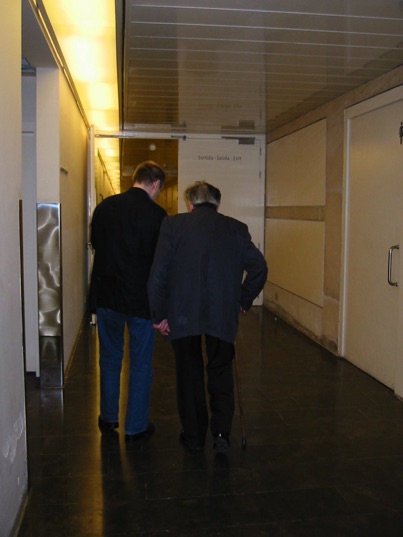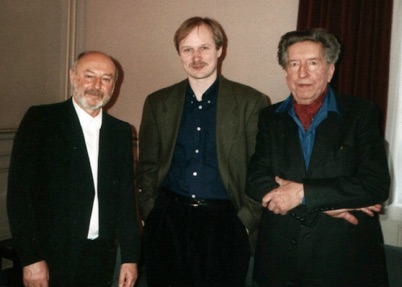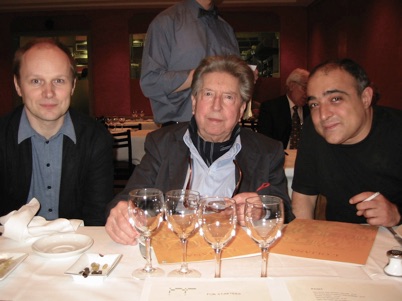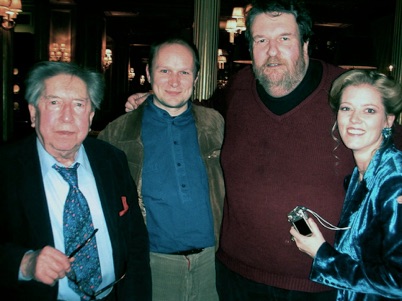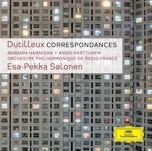Memories of a dear friend
In 1983 I was in London and heard that Rostropovich was going to give the UK premiere of Tout un monde lointain. As I knew the piece from the LP recording but had not heard it in concert yet, I decided to go to the dress rehearsal and the concert. After the rehearsal, at the traffic lights outside the Royal Festival Hall, I realised I was standing next to the composer. Shaking with embarrassment, I acted on my instinct and told him how much I loved his piece and that I was also a young cellist. To my surprise M. Dutilleux seemed happy that someone spoke to him and treated me as if I was a musician he had known for years, he was quite excited to tell that he had just finished the last two movements of the 3 Strophes sur le nom de SACHER and that he would be happy if I played them.
Two years later I had played Tout un monde lointain myself in Helsinki and wanted to leave the recording of the concert discreetly at his mailbox and run away quickly - I had been much too shy to ask him to work with me before that concert. To my shock, at the very moment I was about to drop the cassette in the mailbox he opened the door on his way to the post office. I managed to blurt out some words to the effect that I would love to hear his opinion about the performance. He immediately asked me in and we listened to the recording together. Again, he related to me with all the respect that a person three times my age would have expected, not I. The only criticism he expressed was for the second movement, where the conductor had preferred a slower tempo than what the score indicated. (In the following thirty years of knowing M. Dutilleux I heard countless times his displeasure of people playing his slow movements too slowly.) As I was about to play the piece soon again he invited me to come and play it through with him on the piano in his tiny studio. It was one of those unforgettable moments of which I can recall just one detail, M. Dutilleux stopping every few measures to apologise for playing so badly himself.
I have many wonderful memories of traveling together with M. Dutilleux. His several visits to Helsinki, my embarrassment of driving him around the frozen city in my very old Volkswagen with no heating, or a week in the Hague and Amsterdam when I played Tout un monde lointain with Diego Masson. The last time he came to listen to me play the piece was in Barcelona, Ernest Martínez-Izquierdo conducting. When I played it in Los Angeles with Esa-Pekka Salonen in 2008 he could no longer travel but was very keen to listen to the recording. I have still on my answering machine the message that he left after having listened to the concert, saying that he absolutely wanted it to be put on a CD and that he had even an idea about how to help make it happen financially. His comment on the performance was very typical, he was particularily happy "that you didn't drag about - que vous n'avez pas trainé" It still took six years before I could to record the piece, but the fact that the CD with Orchestre Philharmonique de Radio France came out on his 97th birthday is one of the major joys of my life.
I remember with great happiness the many dinners with M. Dutilleux and his wife, the great pianist Geneviève Joy. She was a person of wonderful sense of humour and totally impenetrable modesty. The only regret I have is that I was never able to make her talk about her own extraordinary life.
I have spent my entire performing life working with composers of my time, but it was in many ways Henri Dutilleux who triggered this passion by showing his interest and trust in the very young and inexperienced musician that I was. He became a very dear friend - in the last years we were in almost constant touch.
When he wasn't able to go to concerts anymore I sometimes took my cello to his home and played pieces from Bach to his composer friends, Betsy Jolas, Pascal Dusapin, Magnus Lindberg and others. In the last months, when he was in hospital I visited him often. I brought my iPhone and small loudspeakers with me and we listened to music every time. After his stroke he wasn't able to listen to purely instrumental music, his brain transposed it so that he couldn't recognise even his own pieces anymore. But if there was a singer in the piece, his brain didn't transpose. Therefore we listened to his two song cycles - Correspondances and Temps l'horloge - countless times, every single time. The first time he heard Correspondences in the hospital he started applauding and said it was a fireworks of happiness for him to listen to music again. The same way, when I came to visit, he always wanted to first hear my voice before seeing me, it was through the voice that he remembered people.
I was able to bring some of his favorite musicians - Simon Rattle and Barbara Hannigan - to visit him at the hospital and to deliver messages from him to others. After a while I started wondering what other music with voice I could play for him. I remembered his love of two popular singers, Sarah Vaughan and Charles Trenet. I downloaded 100 songs from each of them and took them to the hospital. While we were listening to them he got a call from a friend in Neuchâtel and told him that he was just listening to music that he had completely forgotten about, but realised that he had been carrying them in his heart all the time. That day he didn't want me to leave and kept asking for: "just one more..."
The last day at the hospital I decided to try if - after all - he could listen to a purely instrumental piece and played his Sur un même accord for violin and orchestra. That day he was suddenly able to enjoy it, although he didn't recognise it. He kept asking me: "did I really write this?" In the end he decided he quite liked the piece and said "finalement, ce n'est pas si mal".
He was able to return home for the few last weeks. I visited him twice more, once for lunch and the last time with my wife to say goodbye before I left to Quebec for two weeks. It was clear that every visit could be the last, he had started to fade away quietly while retaining his wonderful kindness to the very end. At the beginning of the last visit I told him that I was on my way to meet a younger colleague of his, Philippe Schoeller and towards the end he he said was worried that I would be late, because "one must never keep a composer waiting".
Four days later my phone rang at 5:30 am in Quebec and there was Maria, his faithful governess, who told me that he had just slept away quietly in his bed and could I please quickly call Betsy Jolas, who was about to come for lunch. 30 years of kindness and friendship had moved on to a Whole distant world, absent, almost departed... - Tout un monde lointain, absent, presque défunt...
© Anssi Karttunen 2016
